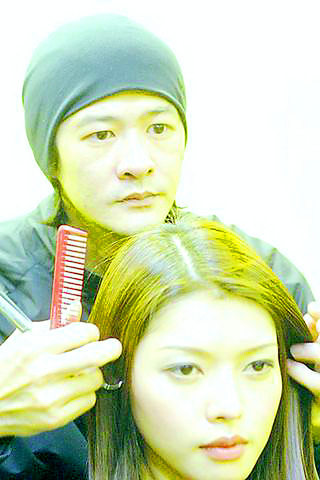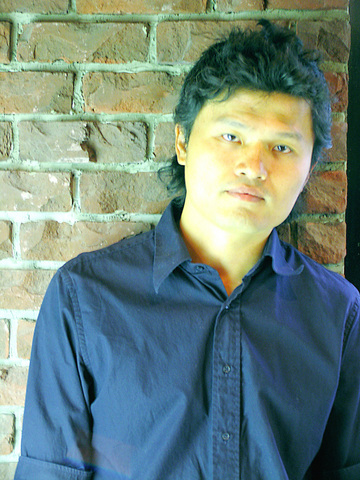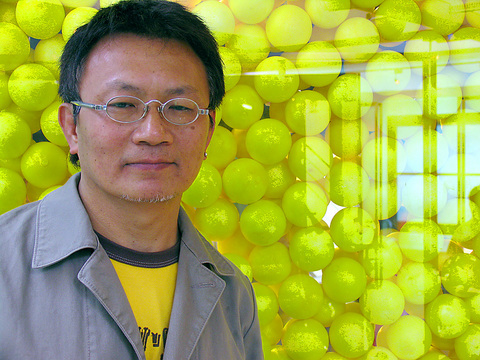Sitting in a leather sofa in a brick-walled salon off Guangfu South Road, I'm offered coffee or tea, a bite to eat and a magazine to flip through. If I'd like, I could also tinkle away at the ivories of a grand piano sitting in the corner. What I really want, though, is a few minutes with Dick Liu (
For that I have to wait. I'm here on the recommendation of Sarah Chen (
Indeed. Chen estimates that Taipei City alone has at least 5,000 hair salons. The county likely has that many again. A walk down Nanjing East Road in just the two blocks west of Zhongshan Road offers over a dozen from which to choose. Many more line the back alleys.

PHOTO COURTESY OF SALON NEWS
Where Los Angeles has its plethora of psychiatrists, Taipei has at least as many hairstylists. It might seem an odd comparison, but the two perform the same service; walk in feeling blue, leave feeling better.
Having lived in both cities, I'm of the opinion that Taipei's hairstylists are more effective.
And quite a bit cheaper. The going rate for a shampoo and trim from one of Taipei's several chain-salon operations is under NT$500. However, if it's the best you're looking for, the price rises higher even as your precious tresses fall to the floor.

PHOTO: SEAN CHAO, TAIPEI TIMES
For this reason, Chen asked that her list of who's "best" rather be considered a list of "leaders" in the industry. Liu she dubbed the "celebrity favorite" for the number of A-list actors and singers who have him on speed dial. She gave "leader in street fashion" honors to Tsai Wen-hai (
"Street fashion," in Chen's words, because of the ease of getting a time slot in one of Tsai's chairs. With nine Yellow Ted branches in Taipei City, Tsai's empire may not reach the four corners of the earth, but it does cover three corners of the Nanjing-Zhongshan intersection.
"I opened the first Yellow Ted on Zhongshan Road in 1981," Tsai said. "We grew out of it and I opened another around the corner. We eventually grew too big for that one too and so I opened another down the street."

PHOTO: DAVID MOMPHARD, TAIPEI TIMES
Asked how many employees staff his style empire, Tsai revealed his management strategy and, likely, the reason he is the leader in street fashion. "They aren't employees," he said. "They're students. Stylists begin as apprentices and, after three to five years, become stylists themselves. We've been able to grow through word-of-mouth alone. I don't advertise."
As for Taipei's "leading female hairstylist," Chen gave a nod to Blanche Lu (
"I'm very much a person with a plan," Lu said. "I was never drawn to hair or beauty when I was young, but since the day I saw I had skill, I began a pursuit to be the best."

PHOTO: DAVID MOMPHARD, TAIPEI TIMES
Lu said the same ambition that has separated her from the pack is the same thing that keeps her on the cutting edge.
"You have to study," she said. "Stylists in Taiwan are lazy and don't read. If you want to be a professional, you have to keep on top of your profession. No one would go see a doctor who didn't read up on the latest techniques."
Liu at H Park agrees. "Reading what others are doing is very important," he said. "So is flipping through magazines, and even going overseas -- Tokyo, Europe and New York -- to see what's happening there. I think we all sneak a peek at each other's work."
One of the people whose work is peeked at more than anyone's, both Liu, Lu and Chen agree, is Andy Wong (
Like Liu, his client list reads like the seating arrangements for the Golden Melody Awards. His designs have graced the covers of Vogue, Elle, Marie Claire and others.
"Beauty is a person's ability to realize their most special characteristics and bring them to the surface," he said. "I only help them realize it." Does he think there are similarities between styling and psychiatry?
"There is an amount of psychology to what I do," he said. "A new style can be the same as a new perspective."

June 2 to June 8 Taiwan’s woodcutters believe that if they see even one speck of red in their cooked rice, no matter how small, an accident is going to happen. Peng Chin-tian (彭錦田) swears that this has proven to be true at every stop during his decades-long career in the logging industry. Along with mining, timber harvesting was once considered the most dangerous profession in Taiwan. Not only were mishaps common during all stages of processing, it was difficult to transport the injured to get medical treatment. Many died during the arduous journey. Peng recounts some of his accidents in

“Why does Taiwan identity decline?”a group of researchers lead by University of Nevada political scientist Austin Wang (王宏恩) asked in a recent paper. After all, it is not difficult to explain the rise in Taiwanese identity after the early 1990s. But no model predicted its decline during the 2016-2018 period, they say. After testing various alternative explanations, Wang et al argue that the fall-off in Taiwanese identity during that period is related to voter hedging based on the performance of the Democratic Progressive Party (DPP). Since the DPP is perceived as the guardian of Taiwan identity, when it performs well,

The Taiwan People’s Party (TPP) on May 18 held a rally in Taichung to mark the anniversary of President William Lai’s (賴清德) inauguration on May 20. The title of the rally could be loosely translated to “May 18 recall fraudulent goods” (518退貨ㄌㄨㄚˋ!). Unlike in English, where the terms are the same, “recall” (退貨) in this context refers to product recalls due to damaged, defective or fraudulent merchandise, not the political recalls (罷免) currently dominating the headlines. I attended the rally to determine if the impression was correct that the TPP under party Chairman Huang Kuo-Chang (黃國昌) had little of a

At Computex 2025, Nvidia CEO Jensen Huang (黃仁勳) urged the government to subsidize AI. “All schools in Taiwan must integrate AI into their curricula,” he declared. A few months earlier, he said, “If I were a student today, I’d immediately start using tools like ChatGPT, Gemini Pro and Grok to learn, write and accelerate my thinking.” Huang sees the AI-bullet train leaving the station. And as one of its drivers, he’s worried about youth not getting on board — bad for their careers, and bad for his workforce. As a semiconductor supply-chain powerhouse and AI hub wannabe, Taiwan is seeing